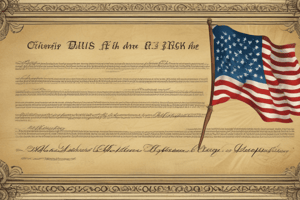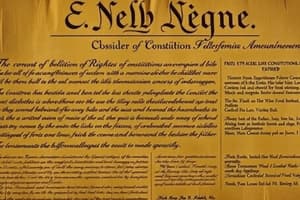Podcast
Questions and Answers
What is the Bill of Rights and why was it added to the Constitution?
What is the Bill of Rights and why was it added to the Constitution?
The first ten amendments protect basic freedoms; especially of the minority groups. It was added to the Constitution to protect the people from the national government from having too much power.
What does it mean to ratify?
What does it mean to ratify?
To approve.
Who were the Federalists?
Who were the Federalists?
Citizens who were in favor of ratifying the Constitution and wanted a strong national government.
Who were the Anti-Federalists?
Who were the Anti-Federalists?
What is due process of law?
What is due process of law?
What are reserved powers?
What are reserved powers?
What is a Cabinet?
What is a Cabinet?
What is a political party?
What is a political party?
Who is John Adams?
Who is John Adams?
Who is Alexander Hamilton?
Who is Alexander Hamilton?
Who is Thomas Jefferson?
Who is Thomas Jefferson?
Who is Benjamin Banneker?
Who is Benjamin Banneker?
What is Washington DC?
What is Washington DC?
What would adding a Bill of Rights to the Constitution do?
What would adding a Bill of Rights to the Constitution do?
Why do you think some Anti-Federalists changed their mind about the Constitution?
Why do you think some Anti-Federalists changed their mind about the Constitution?
Why is the Bill of Rights important?
Why is the Bill of Rights important?
Why was it necessary for the President to have a Cabinet?
Why was it necessary for the President to have a Cabinet?
What does the First Amendment guarantee?
What does the First Amendment guarantee?
What does the Second Amendment protect?
What does the Second Amendment protect?
What does the Third Amendment state?
What does the Third Amendment state?
What does the Fourth Amendment protect against?
What does the Fourth Amendment protect against?
What do the Fifth to Eighth Amendments pertain to?
What do the Fifth to Eighth Amendments pertain to?
What does the Ninth Amendment state?
What does the Ninth Amendment state?
What does the Tenth Amendment declare?
What does the Tenth Amendment declare?
Flashcards are hidden until you start studying
Study Notes
Bill of Rights Overview
- The Bill of Rights consists of the first ten amendments to the Constitution.
- Protects basic freedoms and rights, particularly those of minority groups.
- Added to the Constitution to limit the power of the national government and ensure individual liberties.
- Its inclusion played a significant role in persuading many delegates to ratify the Constitution.
Key Concepts
- Ratify: The act of officially approving an agreement or document.
Federalists vs. Anti-Federalists
- Federalists: Advocates for ratifying the Constitution; supported a strong national government. Key figure: Alexander Hamilton.
- Anti-Federalists: Opponents of ratification; favored less centralized government. Key figure: Thomas Jefferson.
Legal Principles
- Due Process of Law: Guarantees the right to a fair trial by jury.
- Reserved Powers: Authorities that are retained by the states or by the people.
Government Structure
- Cabinet: A group of top advisors to the President.
- Political Party: An organization aimed at electing officials to support its agenda.
Notable Figures
- John Adams: Massachusetts leader, member of Congress, and 2nd President of the U.S.
- Alexander Hamilton: Key organizer of the Constitutional Convention and proponent of a strong national government.
- Thomas Jefferson: 3rd President, author of the Declaration of Independence, and instrumental in the Louisiana Purchase.
- Benjamin Banneker: Notable free African American who assisted in surveying land for Washington, D.C.
Washington, D.C.
- The capital of the United States, strategically located between Maryland and Virginia.
- It functions as a federal district, separate from any state jurisdiction.
Importance of the Bill of Rights
- Adding a Bill of Rights encouraged delegates to support the Constitution.
- Addressed fears that a strong national government could infringe upon individual liberties.
- Protects rights of minorities, ensuring they cannot have their freedoms stripped away.
Role of the President’s Cabinet
- Essential for providing the President with expert advice on various matters, including defense and finance.
Amendments Summary
- First Amendment: Ensures freedoms of religion, speech, press, assembly, and petition.
- Second Amendment: Protects the right to bear arms.
- Third Amendment: Prohibits the quartering of soldiers in private homes.
- Fourth Amendment: Safeguards against unreasonable searches and seizures.
- Fifth to Eighth Amendments: Establish rights associated with due process of law.
- Ninth Amendment: Acknowledges rights not specifically enumerated in the Constitution.
- Tenth Amendment: Affirms that the government can only exercise powers explicitly stated in the Constitution.
Studying That Suits You
Use AI to generate personalized quizzes and flashcards to suit your learning preferences.




